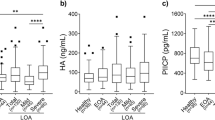Abstract
Background
Osteoarthritis (OA) of the knee is one of the leading causes of disability characterized by degeneration of hyaline cartilage combined with reparative processes. Its strong association with metabolic syndrome is postulated to be due to both mechanical and biochemical factors. Our study aims to study differential effect of metabolic risk factors on cartilage degeneration and regeneration at biomarker level.
Design
After screening 281 patients presenting with knee pain, 41 patients who met the selection criteria were included and were divided into metabolic (MetS) OA and non-metabolic (Non-MetS) OA phenotypes using National Cholesterol Education Programme—Adult Treatment Panel—III (NCEP-ATP-III) criteria for metabolic syndrome. Serum Cartilage Oligomeric Matrix Protein (COMP) and Procollagen type IIA N terminal Propeptide (PIIANP) levels were used as tools to assess cartilage degeneration and regeneration, respectively.
Results
22 among 41 patients (53.66%) had metabolic syndrome. Covariates like age, gender, Kellgren Lawrence (KL) grades were comparable in both groups. MetS-OA group showed significant increase in serum COMP levels (p = 0.03) with no significant effect on serum PIIANP levels (p = 0.46). Hypertriglyceridemia showed independent association with both cartilage anabolism (p = 0.03) and catabolism (p = 0.03).
Conclusion
Metabolic syndrome, though has no effect on cartilage regeneration tends to shift cartilage homeostasis towards degeneration with hypertriglyceridemia showing significant independent effect on cartilage metabolism.

Similar content being viewed by others
References
Misra, A., Choubey, P., Makkar, B. M., et al. (2009). Consensus statement for diagnosis of obesity, abdominal obesity and metabolic syndrome for Asian Indians and recommendation for physical activity, medical and surgical management. The Journal of the Association of Physicians of India, 57, 163–170.
Loeser, R., Goldring, S., Scanzello, C., & Goldring, M. (2012). Osteoarthritis: A disease of the joint as an organ. Arthritis and Rheumatism, 64(6), 1697–1707.
Le Clanche, S., Bonnefont, R. D., Sari-Ali, E., Rannou, F., & Borderie, D. (2015). Inter-relations between osteoarthritis and metabolic syndrome: A common link? Biochimie, 121, 238–252.
Dong, N., Gao, Y. H., Liu, B., Zhao, C. W., Yang, C., Li, S. Q., et al. (2018). Differential expression of adipokines in knee osteoarthritis patients with and without metaboli syndrome. International Orthopaedics, 42(6), 1283–1289.
Pan, F., Tian, J., Mattap, S. M., Cicuttini, F., & Jones, G. (2020). Association between metabolic syndrome and knee structural change on MRI: A 10.7-year follow-up study. Rheumatology (Oxford), 59(1), 185–193.
Eckel, R. H., Grundy, S. M., & Zimmet, P. Z. (2005). The metabolic syndrome. Lancet, 365, 1415–1428.
Xie, D. X., Wie, J., Zeng, C., et al. (2017). Association between metabolic syndrome and knee osteoarthritis: A cross sectional study. BMC Musculoskeletal Disorders, 18(1), 533.
Afifi, A. E. M. A., Shaat, R. M., Gharbia, O. M., et al. (2018). Osteoarthritis of knee joint in metabolic syndrome. Clinical Rheumatology, 37, 2855.
Puenpatom, R. A., & Victor, T. W. (2009). Increased prevalence of metabolic syndrome in individuals with osteoarthritis: An analysis of NHANES III data. Postgraduate Medicine, 121(6), 9–20.
Chadha, R. (2016). Revealed aspect of metabolic osteoarthritis. Journal of Orthopaedics, 13(4), 347–351.
Courties, A., Gualillo, O., Berenbaum, F., & Sellam, J. (2015). Metabolic stress-induced joint inflammation and osteoarthritis. Osteoarthritis and Cartilage, 23(11), 1955–1965.
Staikos, C., Ververidis, A., Droso, G., Manolopoulos, V. G., Varettas, D. A., & Tavridou, A. (2013). The association of adipokine levels in plasma and synovial fluid with the severity of knee osteoarthritis. Rheumatology (Oxford), 52(6), 1077–1083.
Bas, S., Finckh, A., Puskas, G. J., Suva, D., Hoffmeyer, P., Gabay, C., et al. (2014). Adipokines correlate with pain in lower limb osteoarthritis: different associations in hip and knee. International Orthopaedics, 38, 2577–2583.
Sowers, M. R., & Karvonen-Guterrez, C. A. (2010). The evolving role of obesity in knee osteoarthritis. Current Opinion in Rheumatology, 22(5), 533–537.
Fontana, L., Eagon, J. C., Trujillo, M. E., Scherer, P. E., & Klein, S. (2007). Visceral fat adipokine secretion is associated with systemic inflammation in obese humans. Diabetes, 56, 1010–1013.
Daghestani, H. N., Jordan, J. M., Renner, J. B., Doherty, M., Wilson, A. G., & Kraus, V. B. (2017). Serum N-propeptide of collagen IIA (PIIANP) as a marker of radiographic osteoarthritis burden. PLoS One., 12(12), e0190251. https://doi.org/10.1371/journal.pone.0190251.
Verma, P., & Dalal, K. (2013). Serum cartilage oligomeric matrix protein (COMP) in knee osteoarthritis: A novel diagnostic and prognostic biomarker. Journal of Orthopaedic Research, 31, 999–1006.
Van Spil, W. E., DeGroot, J., Lems, W., Oostveen, J., & Lafeber, F. (2010). Serum and urinary biochemical markers for knee and hip-osteoarthritis: a systematic review applying the consensus BIPED criteria. Osteoarthritis and Cartilage, 18, 605–612.
Saberi Hosnijeh, F., Bierma-Zeinstra, S. M., & Bay-Jensen, A. C. (2019). Osteoarthritis year in review 2018: Biomarkers (biochemical markers). Osteoarthritis Cartilage, 27(3), 412–423.
Felson, D. T. (2014). The current and future status of biomarkers in osteoarthritis. Journal of Rheumatology, 41(5), 834–836. https://doi.org/10.3899/jrheum.140094.
Houard, X., Goldring, M. B., & Berenbaum, F. (2013). Homeostatic mechanisms in articular cartilage and role of inflammation in osteoarthritis. Current Rheumatology Reports, 15(11), 375.
Darweesh, H., Abbass, D., Kadah, R., Rashad, A., El Basel, M., & Nasr, A. (2010). Serum and synovial cartilage oligomeric matrix protein in patients with rheumatoid arthritis and osteoarthritis. Indian Journal of Rheumatology, 5, 112–117.
Author information
Authors and Affiliations
Corresponding author
Ethics declarations
Conflict of interest
The authors declare that they have no conflict of interest.
Ethical standard statement
This article does not contain any studies with human or animal subjects performed by the any of the authors.
Informed consent
For this type of study informed consent is not required.
Additional information
Publisher's Note
Springer Nature remains neutral with regard to jurisdictional claims in published maps and institutional affiliations.
Rights and permissions
About this article
Cite this article
Onkarappa, R.S., Chauhan, D.K., Saikia, B. et al. Metabolic Syndrome and Its Effects on Cartilage Degeneration vs Regeneration: A Pilot Study Using Osteoarthritis Biomarkers. JOIO 54 (Suppl 1), 20–24 (2020). https://doi.org/10.1007/s43465-020-00145-z
Received:
Accepted:
Published:
Issue Date:
DOI: https://doi.org/10.1007/s43465-020-00145-z



